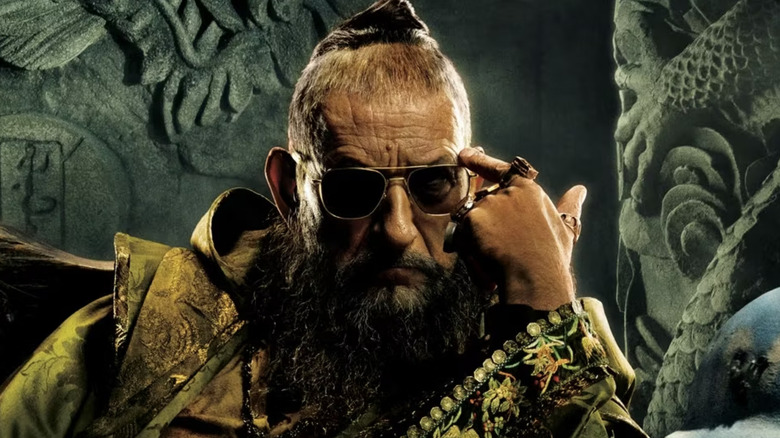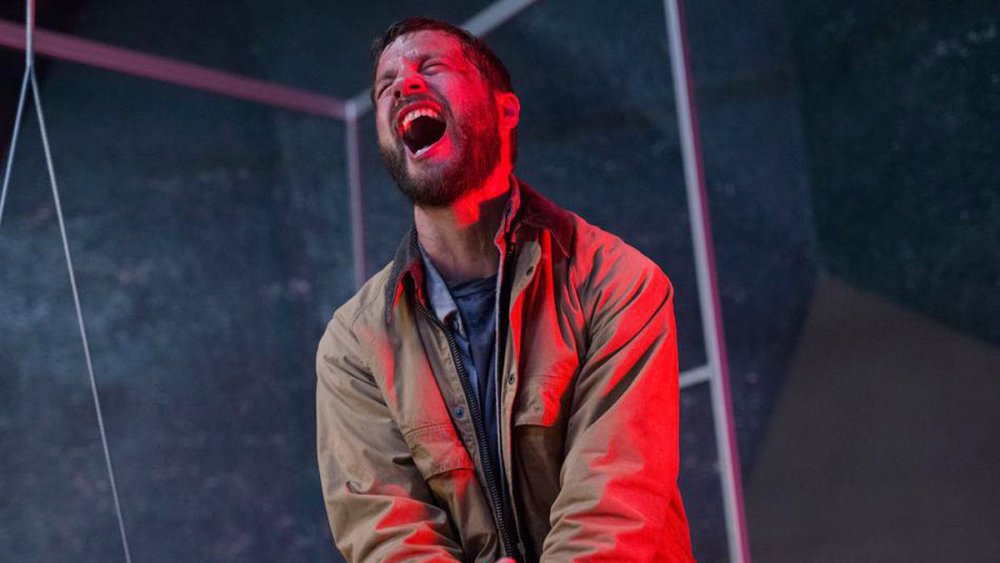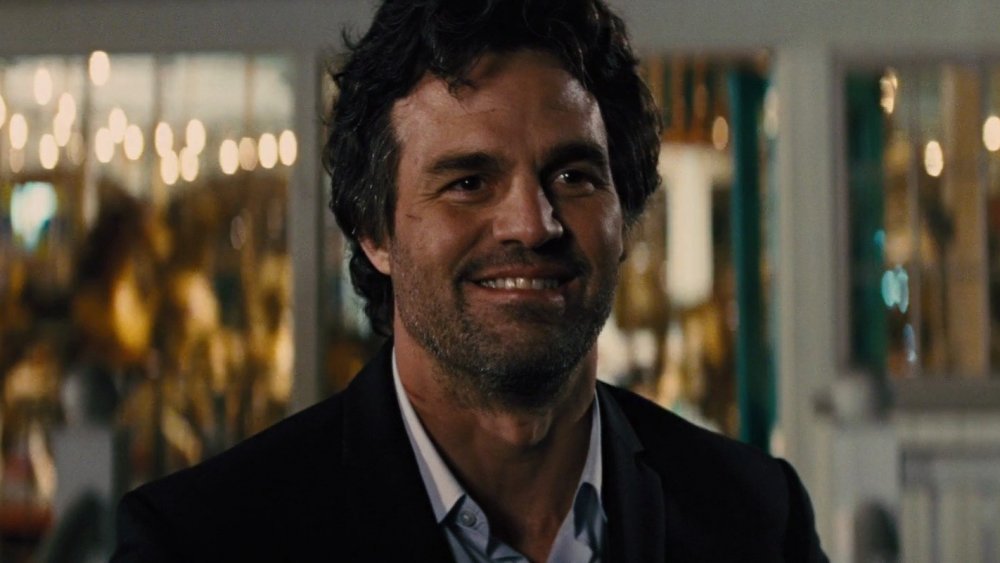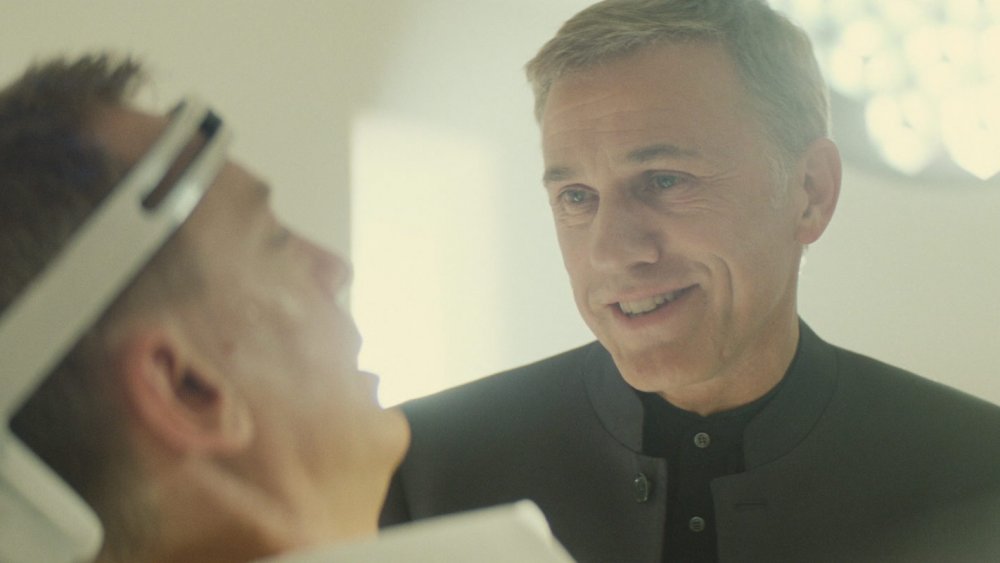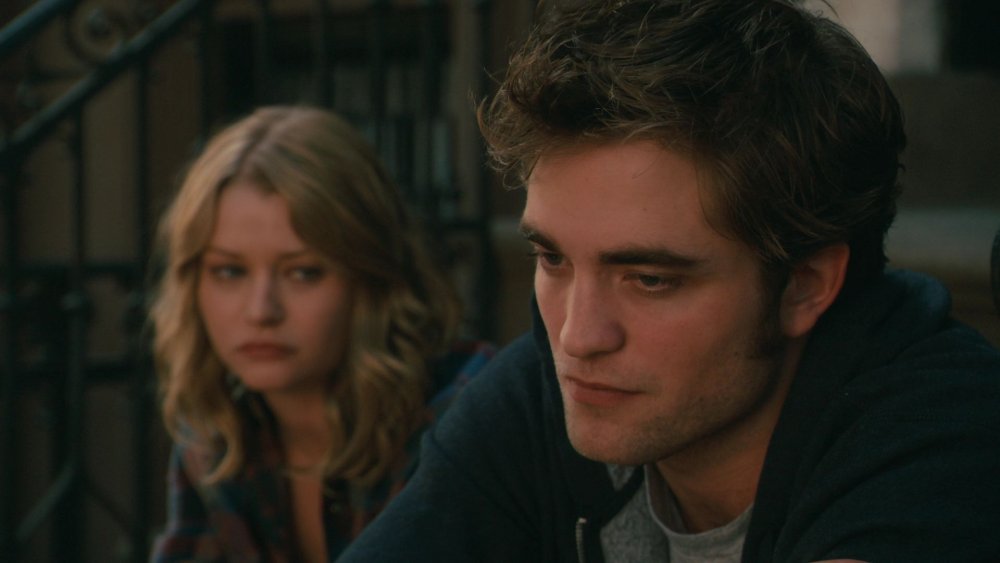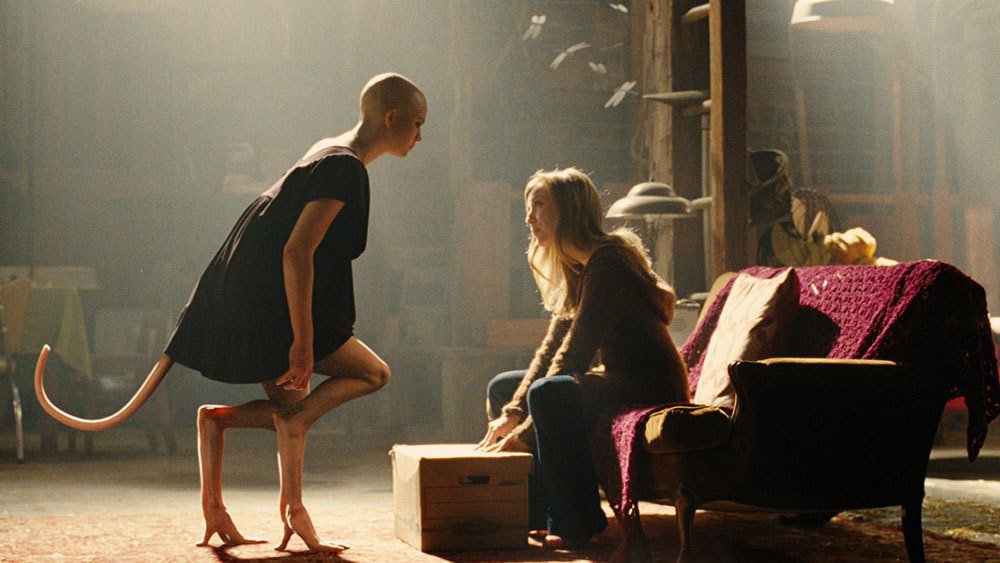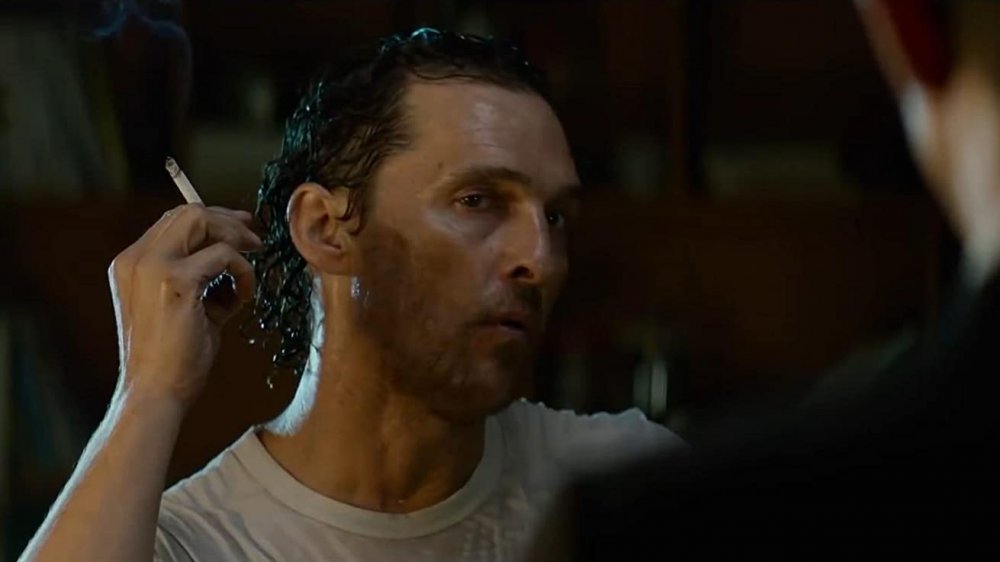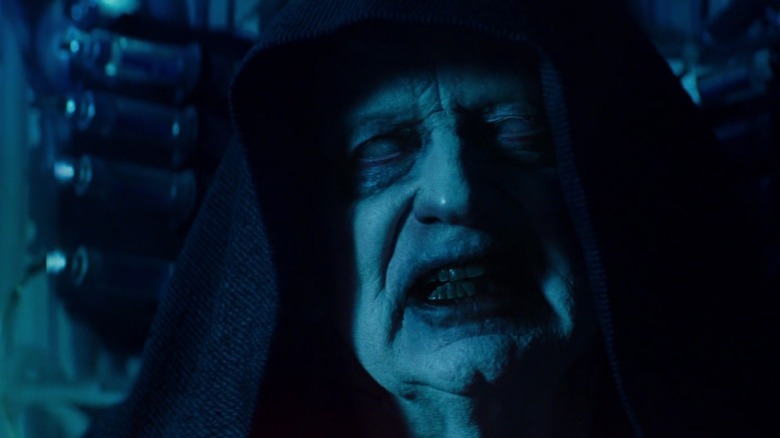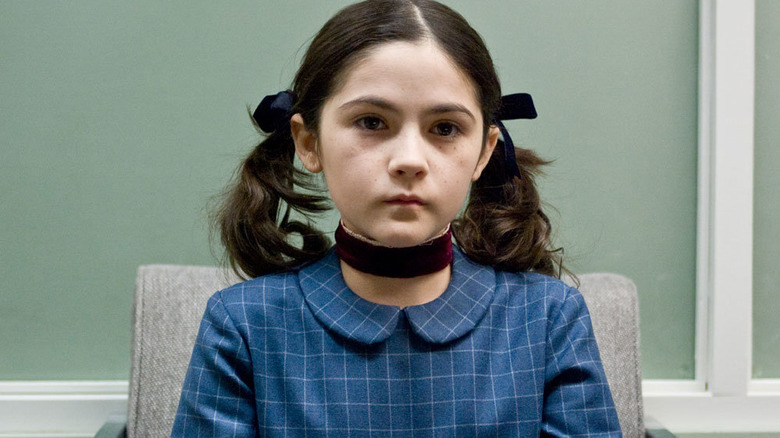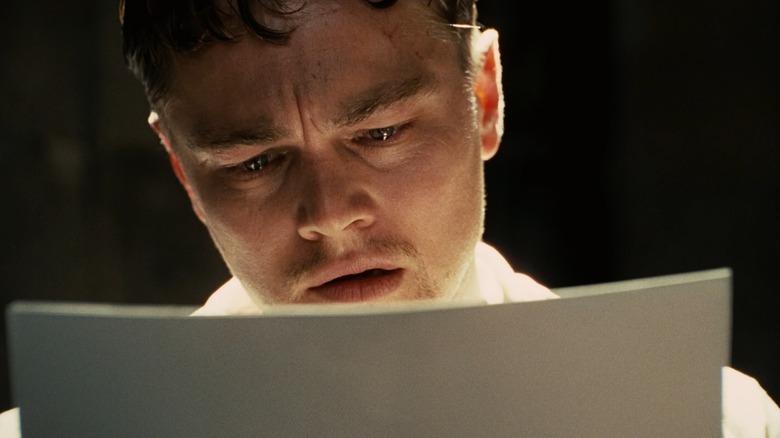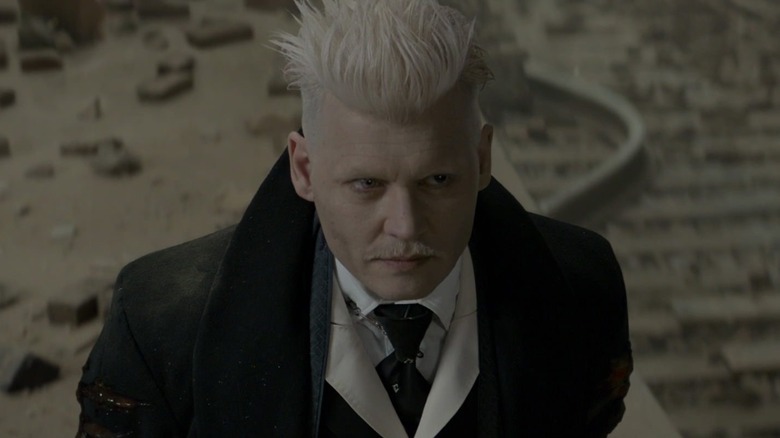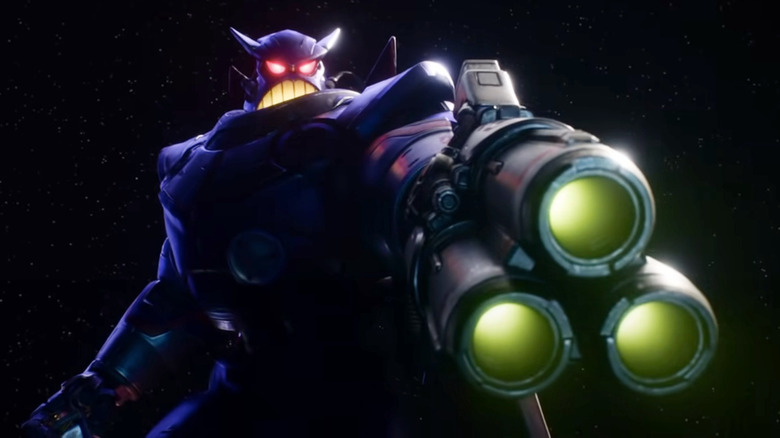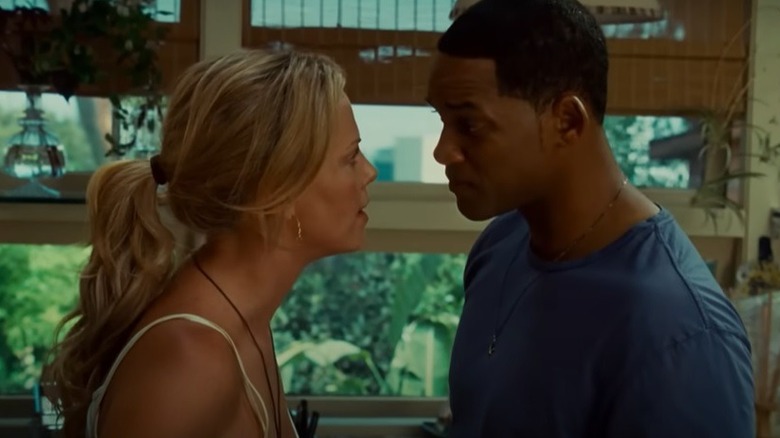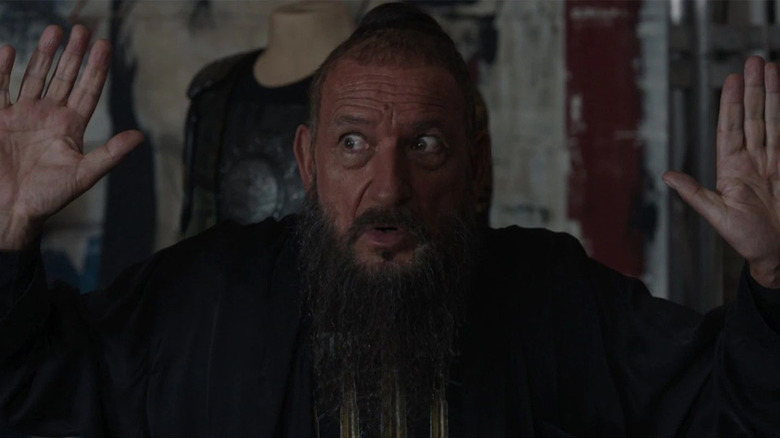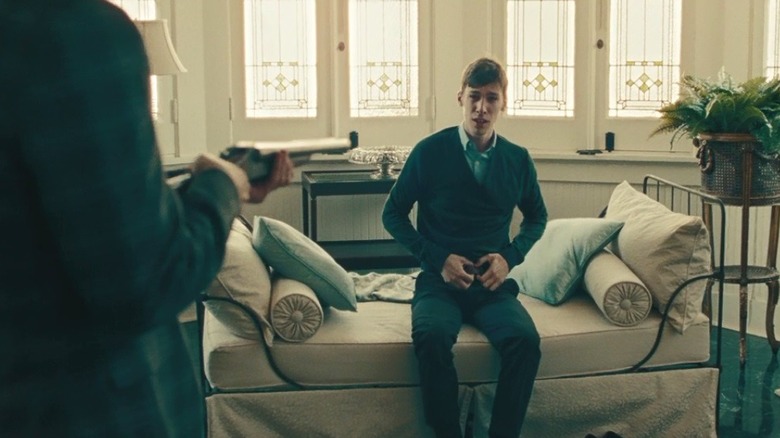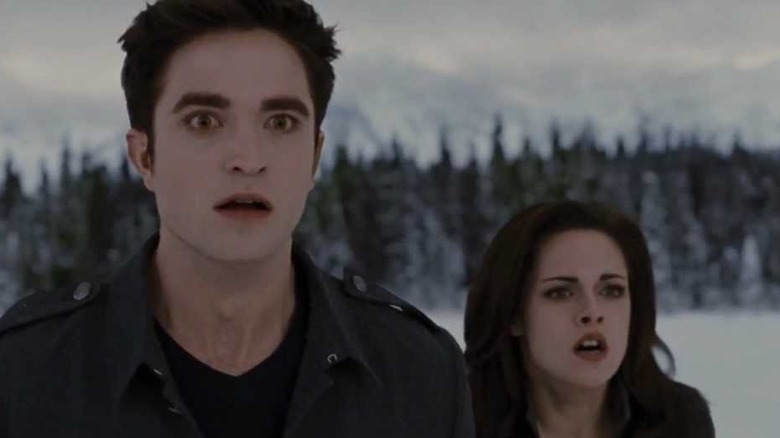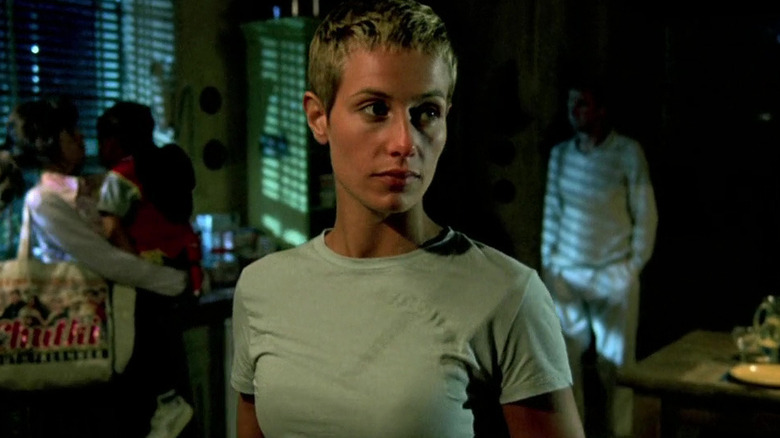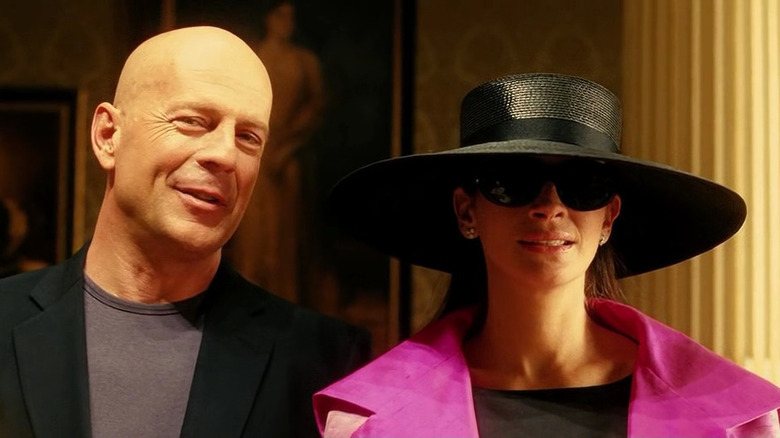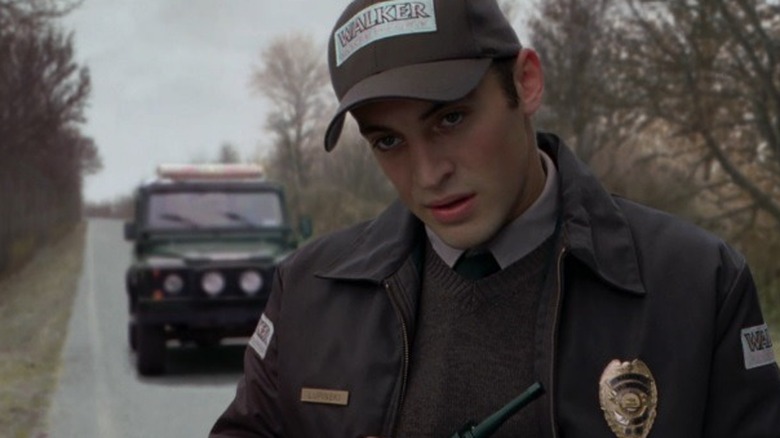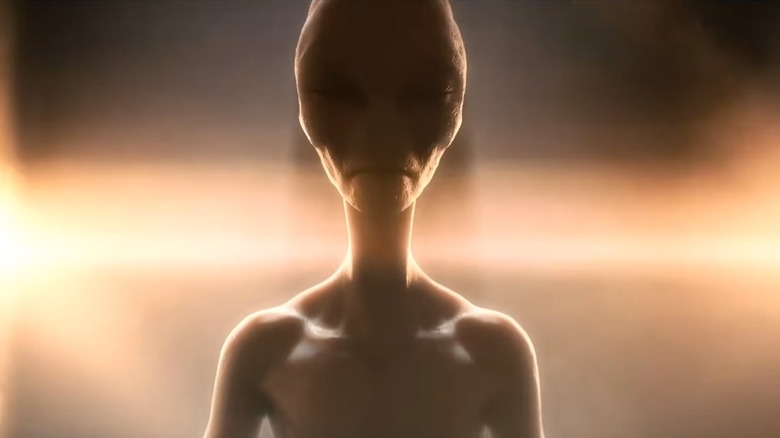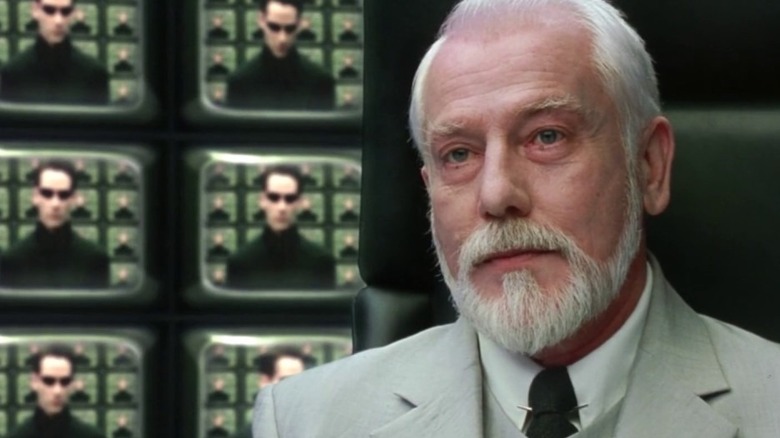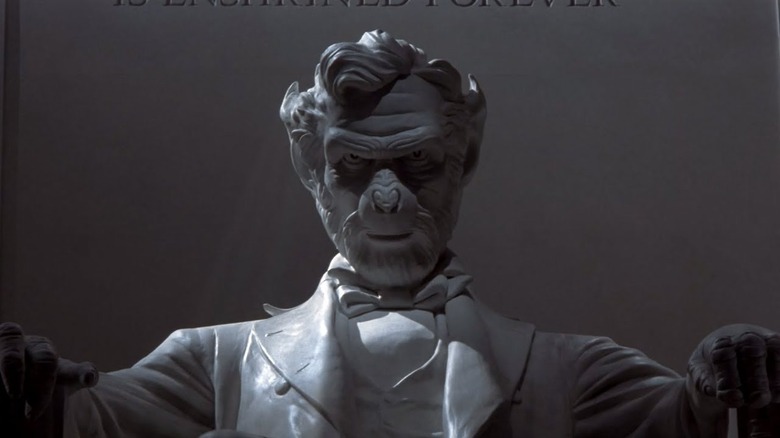Plot Twists That Went Too Far
Properly executed, a good plot twist is the icing on an already delicious cake, a colorful and exciting treat that may very well end up being the part you remember most. But in that execution lies a delicate balance. Make the twist too outrageous or build an entire movie around nothing but twists, and you're handing audiences a cake that's pure icing. Sure, it may taste good at first, but it will soon give them a headache, and afterwards, everyone involved will end up regretting the whole thing.
Let's talk now about movies that just didn't know when to stop piling it on. Look, there have been a lot of movies. Audiences are jaded. The temptation to throw in a big memorable plot twist to set your film apart from the pack must be overwhelming. But this is an advanced maneuver, and even for otherwise seasoned filmmakers at the peak of their craft, big ostentatious reveals don't always work out, and they can sometimes ruin an otherwise good movie.
Then again, including a truly outrageous plot twist in your film is a sure-fire way to get the internet talking about it, so maybe these twists are doing exactly as their creators intended. After all, we're talking about them, right? These are our picks for plot twists that went just a little too far.
Upgrade has one depressing plot twist after another
In "Upgrade," rugged everyman Grey Trace (Logan Marshall-Green) and his wife are attacked by mysterious assailants, with Grey left paralyzed and his wife dead. Shortly after, tech mogul Eron Keen (Harrison Gilbertson) offers Grey a chance to walk again by installing a prototype A.I. named STEM into a chip in Grey's spine. Grey accepts, and after the procedure, finds that not only can he walk again, he can also temporarily gain superhuman reflexes by ceding control of his body to STEM. Grey then uses these abilities to get revenge on the people who attacked him through a series of thrillingly brutal action sequences.
In the end, Grey discovers that Keen hired the goons who attacked him. But it wasn't Keen's idea ... it was STEM's. After Keen invented STEM, the A.I. forced Keen to participate in a plan to give itself a human body. So how does our hero win the day? Well, he doesn't. There's a moment where we think he's won: Grey awakens in a hospital bed, alongside his still living wife, but this is, in fact, just a fantasy world that Grey is trapped in. STEM has now taken full, permanent control of Grey's body.
Between "the rich benefactor is evil," "the A.I. is evil," and "the happy ending is actually a dream," "Upgrade" has three extremely depressing plot twists, all fairly tired sci-fi cliches at this point. Taken together, they end this almost great movie on an gratuitously bleak note.
Now You See Me was way too elaborate
With a little more restraint, "Now You See Me" could have easily been a fun, glamorous crime romp à la "Ocean's Eleven" or "Catch Me If You Can." However, much like a stage magician, "Now You See Me" views metaphorical restraint the same way it views actual physical restraints — as an obstacle to be overcome in an intentionally unbelievable fashion.
The film is a globetrotting cat-and-mouse chase between FBI investigator Dylan Rhodes and a group of Robin Hood-esque criminal stage magicians called the Four Horseman. That premise alone could be more than enough for a cool heist film, but this movie just doesn't know when to quit. Layered on top of that, Rhodes discovers that the Horsemen have ties to an actual ancient order of wizards called The Eye with actual real magic powers.
But that's not all. The final twist is that, although Rhodes has been apparently attempting to catch the Horsemen, he's secretly their leader and a member of The Eye. Presumably, Dylan's entire multi-decade FBI career was all a long con so that he could serve as the group's inside man for a single heist, an idea so inconceivably elaborate that it completely shatters the reality of the film, even more than the actual magic does. In the end, our advice to the Horsemen is the same as our advice to the writers of this film: There was probably a simpler way you could have accomplished your goals.
Spectre made Bond's world a lot less interesting
After Daniel Craig took over as James Bond with 2006's "Casino Royale," Bond films tended toward becoming darker, more personal, and less pulpy in each installment. At least, this was the case until 2015's "Spectre." The film features the long-awaited return of recurring franchise-favorite villain Ernst Stavro Blofeld (Christoph Waltz), leader of the titular, world-spanning criminal organization SPECTRE. In this film, Bond discovers that Blofeld is not only behind all of the plots he's faced over his previous three films, but is also responsible for every major personal misfortune that Bond has ever suffered. This is because Blofeld is James Bond's long-lost, jealous, and vindictive adoptive brother.
We understand why this twist makes sense on paper. Conventional wisdom states that the more powerful the villain, the more interesting the conflict, and also that villains should have a personal relationship with the hero. The logical endpoint of this is to give James Bond an evil brother who single-handedly controls all the crime in the world. Unfortunately, this also means that the once large and indifferent world of Craig's Bond is now much smaller. The source of Bond's problems shifts from "because the world is cold and indifferent and Bond has let it harden his heart" to "because one dude hates him." The former is solved by emotional growth and introspection, the latter is solved by shooting guns and speedboat chases. There's nothing wrong with that, but it's not what made the Craig era great.
Remember Me's plot twist feels very exploitative
For the bulk of its runtime, 2010's "Remember Me" is a fairly standard romantic comedy drama. When troubled college student Tyler Hawkins (Robert Pattinson) is arrested for getting in a fight, he comes up with a plan to get back at the detective who arrested him. After learning that the detective has a daughter around Tyler's age named Ally (Emilie de Ravin), Tyler decides to start dating her so that he can eventually brutally dump her as revenge.
If you've seen a movie before, you know what happens next. Tyler and Ally end up falling in love for real. Ally discover's Tyler's secret, and they break up. Tyler apologizes, and they get back together. If the film ended there, it would've probably been regarded by critics as a middling yet ultimately forgettable endeavor. However, a horrible last-minute plot twist ensured that "Remember Me" will indeed be remembered forever, for good and for ill.
At the end of the film, while Tyler is visiting his father's office, the film reveals that this office building is, in fact, the North Tower of the World Trade Center, and the date is September 11, 2001. Tyler is then killed when the building is destroyed by a terrorist attack. Perhaps in a better film, this could have worked. But this is not that film. Instead, most critics agreed that this plot twist just came across as a crass exploitation of a real-life tragedy that the film didn't even come close to earning.
Splice breaks way too many taboos
In "Splice," when cutting-edge geneticists Clive (Adrian Brody) and Elsa (Sarah Polley) are forbidden by their bosses from using human DNA in their experiments, they ignore these orders and continue their experiments in secret. In doing so, they create Dren (Delphine Chanéac), a eerie, near-human, multi-species hybrid. Clive and Elsa decide to covertly raise Dren as their child, and she starts maturing extremely rapidly, growing through childhood, adolescence, and adulthood over the course of the film.
The twist in "Splice" is more a series of increasingly disturbing developments that culminate in a genuinely upsetting fiasco of a climax. When Dren is a newborn, Clive attempts to drown her. When Dren is a teen, Elsa reveals that Dren's human half is actually her DNA, not an anonymous donor. Once Dren reaches adulthood, she and Clive begin a sexual relationship. Later, Dren spontaneously changes sexes, becoming male, hyper-violent, and territorial. Dren then rapes Elsa and kills Clive, and finally, Elsa kills Dren in self-defense. If that's not enough, the ending reveals that Elsa is pregnant with Dren's child, which she decides to keep.
At times, the script of "Splice" seems to exist merely to violate every possible taboo that the writer could think of, with no deeper meaning or philosophy at its core. It certainly makes for a compelling film the first time you watch it, but it also means you're probably only ever going to want to watch it once.
Serenity's plot twist makes absolutely no sense
Released in 2019, "Serenity" tells the story of Baker Dill (Matthew McConaughey), a boat captain who lives on the remote Plymouth Island. He spends his days trying to hunt down and catch an elusive giant fish named Justice. One day, Dill's ex-wife, Karen (Anne Hathaway), shows up and presents him with an offer. She suspects her husband, Frank (Jason Clarke), is abusing their son, the quiet and introverted Patrick (Rafael Sayegh). Frank plans to visiting Plymouth Island soon, so Karen offers Dill $10 million if he takes Frank out on a fishing trip and ensures that he never returns.
Here's the twist: Plymouth Island doesn't actually exist. This world is actually a realistic video game that was created by — and is being played by — our true protagonist, Patrick. Patrick's real father died a decade earlier, and Baker Dill is a fictionalized version of Patrick's dad that Patrick is using to enact a cathartic fantasy of murdering his stepfather. When Dill finally does decide to kill Frank within the game, Patrick similarly works up the courage to kill Frank in the real world and stabs him with a knife.
Got it? Us neither! "Serenity" is a total mess. It seems like it was written by someone who's never played a video game and may also be a space alien, though to be fair, there's some joy to be had in its utterly incoherent delirium.
The Rise of Skywalker ruined Rey's storyline
"Star Wars: Episode VII — The Force Awakens" was a promising start to a new trilogy, ending with an array of tantalizing unanswered questions. Perhaps the most intriguing of all was the identity of the enigmatic Rey (Daisy Ridley). Despite being a poor orphan from a remote planet with no Jedi training, she had inexplicably strong Force powers. Could Rey perhaps be the long-lost child of some great Jedi?
"Star Wars: Episode VIII — The Last Jedi" pulled the rug out from under audiences by answering this question of who Rey's parents were in the most shocking way of all ... nobody. Her parents were nameless, selfish jerks who sold their daughter into slavery. At first, some considered this a violation of the storyline set up in "The Force Awakens," but later, most fans eventually agreed that it was, in fact, a perfectly logical resolution to the mystery and thematically rich as well, since it showed how anyone can be a hero, not only those from certain bloodlines.
Then "Star Wars: Episode IX — The Rise of Skywalker" happened. In this film, Rey learned that she was, in fact, the long-lost grandaughter of Emperor Palpatine, a reveal that most found equal parts confusing and unnecessary. It's believed by some fans that this new, additional twist was added in to appease fans who disliked the reveal in "The Last Jedi," but it was so poorly handled and nonsensical that it just ended up making things so much worse.
The plot twist in Orphan is just straight-up offensive
"Orphan" tells the story of Kate and John Coleman (Vera Farmiga and Peter Sarsgaard), a couple who adopt a child named Esther (Isabelle Fuhrman) from a local orphanage. Though at first their new daughter seems sweet and innocent, the Colemans eventually begin to suspect that Esther might have a dark side. For its first two acts, "Orphan" is a fairly competent execution of the classic "evil child" horror film. And then it goes completely off the rails in act three.
Throughout the film, Esther seems to have a surprising amount of knowledge of — and interest in — sex, despite being ostensibly nine years old. This culminates with Esther unsuccessfully attempting to seduce her father, John, which causes him and Kate to start digging into Esther's past. Then they learn the truth. Esther isn't a child, she's a 33-year-old woman with a condition called hypopituitarism, which stunted her growth. She uses her childlike appearance to take advantage of people, and she's also a violent murderer.
A wide array of people found the film's plot deeply offensive for multiple different reasons. Some took issue with the way that the film depicted hypopituitarism, a real-life condition that the film grossly misrepresents. Adoption groups also denounced the film for similarly obvious reasons. The backlash was so strong that the home video release of the film even felt the need to include a pro-adoption message on the disc as a way to hopefully counteract its toxic narrative.
Shutter Island ended with a whimper
When dangerous mental patient Rachel Solando (Emily Mortimer) mysteriously vanishes from a maximum security mental hospital, US Marshal Edward "Teddy" Daniels (Leonardo DiCaprio) arrives on "Shutter Island" to solve the case. As he digs deeper, Teddy begins to suspect that Andrew Laeddis, the man who murdered the marshal's wife, Dolores Chanal (Michelle Williams), is also somewhere on the island, and he vows to find him as well.
After an array of frightening encounters and surreal visions, Teddy makes a horrifying discovery. In truth, he's Andrew Laeddis, a patient at the facility. He killed his own wife, and this entire investigation has been, in fact, an elaborate LARP staged by his doctors to give him a chance to confront his inner demons. The kicker? "Edward Daniels" is an anagram for "Andrew Laeddis," and "Rachel Solando" is an anagram for "Dolores Chanal."
When "Shutter Island" hit theaters, critics responded with a resounding "meh." The plot of "a man investigates a murder only to discover that he is the murderer" has been done before, and much better, in other films. As a non-spoiler example, in "Adaptation," the fake parody movie "The Three" essentially has a version of this plot, and it exists solely to be a joke about Hollywood cliches. "Shutter Island" is still a fairly decent film, so it's hard to get too fired up about this one, but still, did we need another "it was all in his head" movie?
The ending of Fantastic Beasts and Where to Find Them isn't so fantastic
"Fantastic Beasts and Where to Find Them" opens with a montage of news headlines, telling us that evil wizard Gellert Grindelwald is still at large and could be anywhere. (Remember this for later.) Then the film proper begins. Our hero, Newt Scamander (Eddie Redmayne), is a magizoologist who's just arrived in New York City in 1926 with a magical suitcase full of rare magical creatures. Scamander soon runs afoul of Percival Graves (Colin Farrell), a high-ranking official in the magical government of the US. Graves asserts that one of Scamander's creatures is responsible for the death of a local politician, but in truth, Graves is attempting to frame Scamander to cover up his own crimes.
Once Graves is exposed and defeated, Scamander discovers that Graves has magically disguised his appearance. After dispelling this magic, Scamander reveals that Percival Graves is actually — in a shockingly underwhelming twist — Gellert Grindelwald (Johnny Depp).
To be fair, Grindelwald is an important figure in larger "Harry Potter" lore, but up until that moment, within this particular story, he does not matter at all. Sure, we technically get a bit of a tease about Grindelwald at the beginning, but he's barely mentioned throughout the rest of the film, and when he finally appears, to be honest, we've totally forgotten about him. Some die-hard "Harry Potter" fans may have found the presence of Grindelwald to be a cool reveal, but everyone else was just scratching their heads in confusion.
Lightyear retcons a great Toy Story 2 gag
It needs to be said that parodying the "Luke, I am your father" moment from "Star Wars" — even if Darth Vader never actually speaks that exact line — has been done to death at this point. It was already a bit tired even by 1999, when "Toy Story 2" was released. Even so, Emperor Zurg revealing to Buzz Lightyear that he is Buzz's father near the end of that movie was a well-executed joke that leads into the even funnier scene of Buzz and Zurg making up for lost bonding time by playing catch together.
While 2022's "Lightyear" is meant to be a movie within the "Toy Story" universe rather than its events actually taking place in the "Toy Story" universe, the conceit is that it still serves as the official origin of the Buzz Lightyear character. So everything that happens in "Lightyear" should still be accurate to the in-universe canon of Buzz Lightyear. Which makes the film's twist that Zurg isn't Buzz's father, but Buzz himself from the future, all the more baffling, as it seems to retcon the fun resolution of Buzz and Zurg's relationship in "Toy Story 2."
It's all the more disappointing when you learn that Zurg was, in fact, originally meant to be Buzz's father in "Lightyear" — and even more so since we would have learned that Zurg's real name was the hilariously awesome Larry Lightyear.
Hancock's twist feels like it's from a different movie
These days, it's not unusual for a superhero movie or TV show to address the question of what would happen if a superhero was also an a******. Thanks to the films of the DC Extended Universe, even Superman isn't immune from that type of characterization anymore. But when "Hancock" was released in 2008, it felt like a novel conceit to build a movie around — never mind that superhero movies in general were still not quite an entire industry unto themselves at that point.
And that aspect of "Hancock" works wonderfully, helped along by the titular character being portrayed by Will Smith, who is clearly enjoying the chance to play against type and not be his usual good-hearted hero with everyone's best interests at heart. Also effective is the first big twist of the movie, in which it's revealed that Charlize Theron's character also secretly has powers comparable to Hancock's.
But then everything falls apart when the movie decides one twist wasn't enough and tacks on a second one: That the two lead characters are actually 3,000-year-old immortal beings who are the last of their kind, and also can't help but fall in love — but then lose their powers whenever they do. It really does feel like part of an entirely different movie that was grafted onto this one, and ruins what was otherwise a fun, unique twist on the superhero movie genre.
Iron Man 3 spoils a classic Marvel villain
After the Marvel Cinematic Universe had been around for a few years and most of the big characters were introduced, it paved the way for lesser-known — to the mainstream, non-comic-reading public, anyway — heroes and villains to finally come to the big screen. In the case of "Iron Man 3," that meant bringing longtime Iron Man antagonist The Mandarin — arguably his primary archenemy in the comics — to the MCU. The announcement that the Mandarin was to be played by Ben Kingsley only further fanned the flames of fan excitement for the character's live-action debut.
Except Kingsley wasn't the Mandarin. Kingsley was revealed instead to be playing an actor named Trevor Slattery, who was only portraying the Mandarin while the "real" Mandarin — Aldrich Killian (Guy Pearce) — was the one pulling the strings. Slightly disappointing, but not necessarily a dealbreaker depending on how the movie played it. And how the movie played it was to have Trevor Slattery be a bumbling slacker, a down-on-his-luck struggling actor who couldn't intimidate a kitten let alone someone like Tony Stark (Robert Downey Jr.).
The MCU has had Trevor Slattery pop up again in various movies and TV shows in an attempt to redeem him, and it has kind of worked, while the MCU partially redeemed itself by having Tony Leung give an outstanding performance as the true Mandarin in "Shang-Chi and the Legend of the Ten Rings."
Oldboy tries too hard to one-up the original's twists
The original "Oldboy" was a 2003 action thriller masterpiece from South Korean filmmaker Park Chan-wook. It also ends with a succession of plot twists that feel like one gut punch after another, until you're left reeling by the time the end credits roll. When it was announced that Spike Lee would be doing an American remake of "Oldboy," one of the first things that fans of the original movie wondered was how the plot twists would be handled. After all, they deal with not one but two different examples of incest — one involving siblings, and one involving a father and his daughter.
On one hand, it's refreshing that the "Oldboy" remake didn't sanitize the twists, as they are integral to the plot of the movie and the way everything is resolved. On the other hand, the decision to take the twists even further just cheapened the whole thing. While the original revealed that the main antagonist had had a sexual relationship with his sister, the remake's antagonist (Sharlto Copley) not only had that same relationship with his sister, but both siblings also had it with their father. There is a delicate balance with this type of thing, and bringing the twist to that next level completely shattered that balance and made it shocking just for the sake of being shocking — a feeling the original didn't elicit.
Twilight: Breaking Dawn -- Part 2's final fight fake-out falls flat
For a movie franchise that is heavily built around the bitter rivalry between vampires and werewolves — and also about how a vampire guy is nervous to consummate his marriage to his human bride for fear of how badly he might hurt her in bed — the "Twilight Saga" is relatively tame throughout. When there is a battle or a love scene, it stays very much within the confines of PG-13 and keeps its largely teenage girl audience in mind. That is, until the shockingly violent battle that occurs near the end of "The Twilight Saga: Breaking Dawn — Part 2."
Necks are snapped. Limbs are removed. Multiple heads are torn clean off their bodies. Several main characters are slaughtered. It's one shocking moment after another in a surprisingly gruesome battle that goes on for close to 10 minutes. Readers of the books were especially shaken as that fight doesn't happen in the original novels. But apparently, it doesn't happen in the movie, either. At the end of the fight, it's revealed that it was all just a vision, one that can be — and ultimately was — entirely avoidable.
As loud as the gasps were during the fight, the collective groan after the twist put the gasps to shame. Sure, it was still entertaining to watch as it was happening, but few storytelling tropes are more tired than the "it was all a dream" cop-out.
Temptation: Confessions of a Marriage Counselor perpetuates an HIV stigma
Tyler Perry's bread and butter is crowd-pleasing message movies. Typically, those messages fall along the lines of "family is everything" or "don't let anyone get in the way of your dreams." In the case of Perry's "Temptation: Confessions of a Marriage Counselor," that message isn't quite as positive or uplifting. In fact, it's downright offensive when you take a closer look at it.
The plot of "Temptation" is that the titular marriage counselor, Judith (Jurnee Smollett-Bell), ends up having an affair with one of her business colleagues. The movie goes through most of the typical motions of a story like this: stolen glances lead to steamy encounters between people who are being unfaithful, until eventually their lies catch up with them. Anger and heartbreak ensues. Cheaters dealing with the consequences of their actions is one thing, but it's in the nature of one of those consequences that things take a gross turn.
It is revealed that Judith has contracted HIV from the man she was having an affair with. The movie ends with her alone and picking up her HIV medicine when she bumps into her ex, who has remarried and had a child. More than one critic pointed out that the whole thing smacks of Judith "deserving" to get HIV because of her sinful ways, which perpetuates a very harmful stigma that HIV and AIDS are just nature's way of punishing promiscuous behavior.
High Tension's twist is as eye-rolling as it is impossible
In the 2002 movie "Adaptation," the movie's version of Charlie Kaufman (Nicolas Cage) argues with his fictional brother Donald (also Cage) about Donald's screenplay. Donald says that the twist of his movie is that the killer and the cop are revealed to be the same person, which enrages Charlie — in part because it makes things like the screenplay's car chase between the two characters literally impossible. But Charlie apparently doesn't know what he's talking about as everyone else in the movie is in love with Donald's script and thinks it's extremely clever.
The point, of course, is that everyone loving Donald's script is a mockery of how easily impressed moviegoing audiences are by such twists, and that they don't even care if the twist doesn't hold up to any scrutiny whatsoever. Apparently, the filmmakers behind "High Tension," released the following year, missed that point entirely — and instead, made a movie that basically does that exact same thing. "High Tension" spends much of its runtime being an incredibly entertaining psychological thriller, but all of that is erased by the reveal at the end that the victim and the killer that was pursuing her are one and the same.
Not only does it feel completely unearned and not even remotely hinted at previously, but it makes a large chunk of the movie's scenes impossible — including, yes, a car chase between the two.
Ocean's Twelve thinks its meta twist is more fun than it actually is
In the original "Ocean's Eleven" — well, the original as in the 2001 movie, not the actual original from 1960 — Julia Roberts plays Tess, ex-wife of Danny Ocean (George Clooney) and the woman whose affection Danny robs an entire casino just to win back. In follow-up "Ocean's Twelve," it is revealed that Julia Roberts herself actually exists within the universe of the movies. And, wouldn't you know it, Tess happens to look an awful lot like Julia Roberts, a fact which is exploited as part of the heist driving the film.
Writer George Nolfi and director Steven Soderbergh no doubt thought they were being very clever and very meta by having Roberts play both Tess and herself in "Ocean's Twelve." But it just ends up feeling like Soderbergh's love for being able to gather A-list celebrities and getting them to act silly run amok. Thankfully, we don't ever see Tess and Roberts in the same place, though they do talk to each other on the phone, which is more than enough. The Rotten Tomatoes consensus for "Ocean's Twelve" calls it "self-satisfied and illogical," and much of that certainly stems from hanging so much of this impressively star-studded movie on Julia Roberts playing two characters, one of which is herself.
The Village's big reveal elicited groans rather than gasps
While not his first movie, "The Sixth Sense" was the film that put writer-director M. Night Shyamalan on the map and seemed to announce one of Hollywood's brightest new talents. Much of the hype around the movie was its big twist at the end — which was that Bruce Willis's character was actually killed in the beginning of the movie and had been a ghost the entire time. The twist was such an integral part of the film's marketing and word-of-mouth buzz that Shyamalan decided to do another twist with his next movie. And the one after that. And, unfortunately, the one after that, too.
While the twists in "Unbreakable" and "Signs" still worked to varying degrees, "The Village" saw Shyamalan's love of trying to shock audiences with endgame reveals completely eat itself. There seems to be one twist after another as "The Village" winds down, culminating in the ultimate one — that what we thought was a movie set in the 19th century actually takes place in the modern day, in a town that had been intentionally cut off from the outside world. Seeing not only a modern-looking police officer but also a Jeep, in this movie that supposedly takes place 100 years before that would have been possible, was meant to be a mind-blowing moment — but it was an eye-rolling one instead.
Indiana Jones and the Kingdom of the Crystal Skull forgets that less is more
"Indiana Jones and the Kingdom of the Crystal Skull" got a lot of grief for a lot of reasons. There's the whole "nuking the fridge" thing, of course, which was so maligned that some suggested that the term should replace "jumping the shark" to describe the moment that a franchise takes a turn for the worst. And then there's the twist at the end that aliens were behind the whole thing, and very much exist in the universe of "Indiana Jones."
Steven Spielberg and George Lucas justified having aliens be the crux of "Crystal Skull" because pop culture was all about UFOs in the 1950s, when the movie was set. And that's fine. It's also fine that there is a fair bit of magical realism in the movie, as that's always been part of the franchise — something that a lot of people seem to forget. The third movie ended with Indy (Harrison Ford) finding the actual, functioning Holy Grail, after all.
No, where things go too far in the finale of "Crystal Skull" is in actually showing not only the aliens but a UFO rising up from the ruins and zooming off into space. Beyond the special effects being strangely lackluster for a Spielberg-Lucas production, there's just something to be said for telling and not showing when it comes to that type of thing.
The Matrix Reloaded spends 8 minutes explaining its twist
The general consensus is that "The Matrix" should have just been a standalone movie, and not stretched into an entire franchise. It was evident pretty early on in the first sequel, "The Matrix Reloaded," that the movie was way too in love with its own lore and was trying to build itself into a much more complex universe than it was going to be able to sustain. The twist that "our" Neo (Keanu Reeves) isn't the first Neo but one of many was a pretty interesting one. But it's the way that twist was revealed that sent things spinning out of control.
For over seven agonizing minutes, a monotoned man known as The Architect (Helmut Bakaitis) sits across from Neo in a white room and explains every single last detail of the twist — but most audience members were still confused. You shouldn't need a character to deliver 7+ minutes of dense exposition in order to fully explain the most pivotal moment of your movie. That's either lazy writing, or its a reveal that is too convoluted for its own good.
"Reloaded" also has the twist of Neo being able to use his powers in the real world, as well as Neo saving a dying Trinity (Carrie-Anne Moss) with love or whatever. It's ... a lot. And what's worse is that there was then an entire third "Matrix" movie after that, which somehow had to be built upon the mountain of ridiculous and confusing twists that ended the previous film.
Planet of the Apes (2001) became the stuff of bad twist legend
When discussing movies with bad endings, movies with twists gone awry, or any other examples of a movie ending on a laughably terrible note, it's impossible not to bring up Tim Burton's 2001 remake of "Planet of the Apes." While Burton's film output has been wildly inconsistent for many years now, his name was still considered an automatic mark of quality when "Planet of the Apes" was released. Up to that point, he hadn't yet made anything approaching a bad movie. But "Planet of the Apes" changed all that.
The one thing that the movie did decently is that it was pretty good at marrying what were then-cutting edge visuals and makeup effects with the same cheesy B-movie spirit of the original "Apes" films. But whatever affection anyone might have mustered for the movie completely went out the window with a twist ending that tried to subvert the original's "it was Earth all along!" reveal but fell on its face in the process.
That is, if you can even fully decipher it. There's something about another planet and time travel and changing earth's history yadda yadda yadda. It's a ridiculous mess, capped off by an image that wants to be powerful but ends up one of the most nonsensical in the history of film — the Lincoln Memorial, with Lincoln looking like an ape. Oof.
